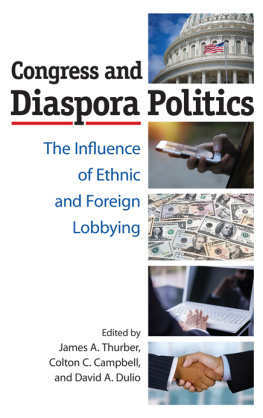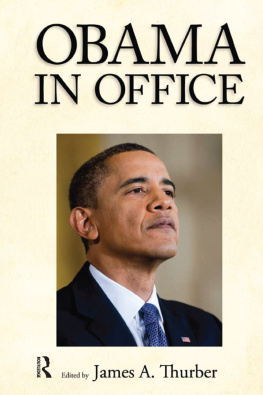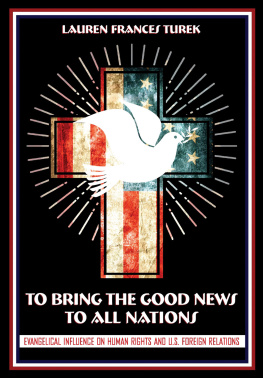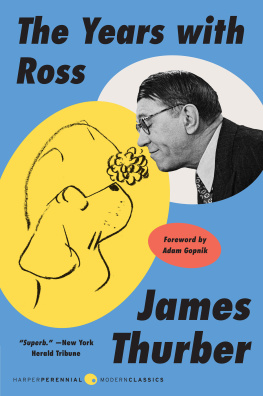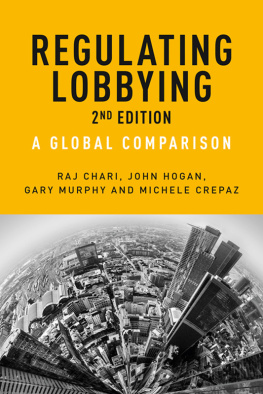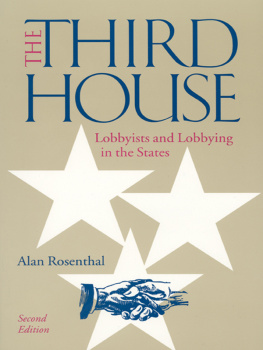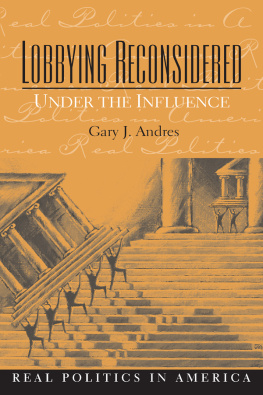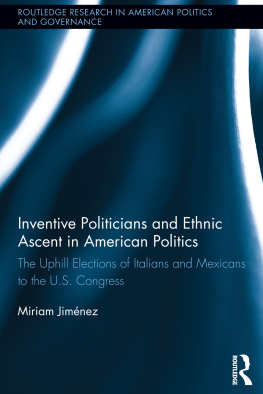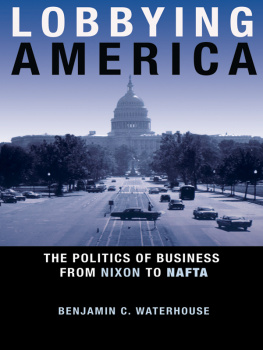Congress and Diaspora Politics
Congress and Diaspora Politics
The Influence of Ethnic and Foreign Lobbying
Edited by
James A. Thurber, Colton C. Campbell,
and David A. Dulio
Published by State University of New York Press, Albany
2018 State University of New York
All rights reserved
Printed in the United States of America
No part of this book may be used or reproduced in any manner whatsoever without written permission. No part of this book may be stored in a retrieval system or transmitted in any form or by any means including electronic, electrostatic, magnetic tape, mechanical, photocopying, recording, or otherwise without the prior permission in writing of the publisher.
For information, contact State University of New York Press, Albany, NY
www.sunypress.edu
Library of Congress Cataloging-in-Publication Data
Names: Thurber, James A., editor. | Campbell, Colton C., editor. | Dulio, David A., editor.
Title: Congress and diaspora politics : the influence of ethnic and foreign lobbying / edited by James A. Thurber, Colton C. Campbell, and David A. Dulio.
Description: Albany : State University of New York Press, 2018. | Includes bibliographical references and index.
Identifiers: LCCN 2017044277 | ISBN 9781438470870 (hardcover : alk. paper) | ISBN 9781438470894 (ebook)
Subjects: LCSH: LobbyingUnited States. | Pressure groupsUnited States. | MinoritiesPolitical activityUnited States. | Foreign agentsUnited States. | United StatesForeign relations. | United States. Congress.
Classification: LCC JK1118 .C58 2018 | DDC 328.73/078dc23
LC record available at https://lccn.loc.gov/2017044277
10 9 8 7 6 5 4 3 2 1
Contents
James A. Thurber, Colton C. Campbell, and David A. Dulio
Chuck Cushman
Patrick Griffin and William Danvers
Kirk J. Beattie
Khalil Mousa Marrar
Julien Zarifian
Walter Clark Wilson and William Curtis Ellis
Patrick J. Haney
Christian Collet
Gregory C. McCarthy
Tables and Figures
Tables
Figures
Acknowledgments
As with any collaborative project, this book would not have been possible without the cooperation of many people. We must first thank Michael Rinella at SUNY Press for agreeing that a better understanding of ethnic and foreign lobbying in Congress was worth publishing. We also extend special thanks to Eileen Nizer, who shepherded the book through the production process. Our academic colleagues who contributed chapters deserve particular mention for committing to this novel project and for delivering such insightful works in an efficient and professional manner. A special thank you goes to the reviewers, who provided thoughtful and timely input. We would also like to thank our colleagues at American University, the National War College, and Oakland University for their continued guidance and support. Finally, we would like to acknowledge our families whose support and patience remains constant. Jim Thurber would like to thank his wife Claudia and his family. Colton Campbell would like to thank his wife Marilyn and son Caden. Dave Dulio would like to thank his wife Adrianne and daughters Abby and Sophia. To all these individuals we express our deepest appreciation.
Chapter 1
Congress and Diaspora Politics
The Influence of Ethnic and Foreign Lobbying
J AMES A. T HURBER , C OLTON C. C AMPBELL ,* AND D AVID A. D ULIO
The Obama administrations push to approve a nuclear accord with Iran in 2015 captured the attention of many Americans, especially those of Jewish descent, not just because of its potential security implications for Israel, but because of the American Israel Public Affairs Committees (AIPAC) inability to corral lawmakers on both sides of the aisle to produce their desired policy result. The lobbying powerhouse, which some argue has undue influence over Congress,
Foreign governments also are increasingly relying upon hired lobbyistsoften former lawmakers and their staffrather than just their diplomats to promote their policies with members of Congress and officials of the executive branch.
Congress first regulated lobbyists for foreign governments in 1938 with the Foreign Agents Registration Act (FARA) in an effort to curb growing Nazi influence within the United States. FARA, however, has evolved over time. The first focus after World War II was communism and secret agents inside the United States. In the mid-1960s, FARA was amended to move away from hidden agendas and toward agendas that were arguably more transparentthose of governments more friendly to the United States who would try to influence U.S. policy. An additional evolution was the addition of provisions that call for the criminal prosecution of foreign agents who make campaign contributions to federal candidates in the U.S. Today, any foreign agent who lobbies and conducts political activity on behalf of a foreign government must register with the Department of Justice, detailing the extent of their relationship with the foreign nation, how much they are paid, etc. Even so, FARA has seen relatively weak enforcement and few prosecutions. However, FARA in general and its criminal provisions in particular came into greater focus during the first months of Donald J. Trumps presidency with investigations, indictments and guilty pleas surrounding accusations made against the 2016 Trump campaign. In December 2016, a bipartisan group of members of Congress
The lobbying efforts of ethnic groups, particularly ethno-national diaspora, at times combine with and promote the interest of a homeland government, especially in the area of U.S. foreign policy. When progress on the deal stalled in India, USINPAC met with senior leaders in the Indian legislature to understand their differing perspectives on the issue.
At other times a diasporas interests might diverge from its home government.
Lawmakers whose constituencies had large diasporic communities of Vietnamese, however, opposed granting PNTR status to Vietnam on the basis of poor human rights and religious freedom conditions in Vietnam. Just two months ago, the Vietnamese government arrested my constituent, a U.S. citizen, Cong Thanh Do, declared Representative Zoe Lofgren (D-CA). Mr. Do had posted comments on the Internet while at home in San Jose, California advocating that Vietnam undergo a peaceful transition to a multiparty democracy. For exercising his U.S. Constitutional right of free speech, the Vietnamese arrested him and held him in prison for 38 days in Vietnam without charges.
To the surprise of House leadership, congressional opposition stymied its initial attempt to expeditiously consider PNTR as a stand-alone measure under Suspension of the Rules.
In another example, at the start of the new Obama administration, Afghanistan increased the amount it paid lobbyists by more than 205 percent compared to previous years during the Bush administration.
This volume addresses several themes related to the topic, including the strategies and tactics employed by ethnic groups in the United States and foreign nations abroad, a range of issuesin both domestic and foreign policythat are of interest to foreign governments and ethnic groups in the United States, and the successes (and failures) of these efforts. Before turning to more details on the volume, we examine ethnicity and lobbying in a broader context. These examples of only a few recent instances raise questions about the general practice of lobbying by different ethnic groups and foreign nations who have interests being considered by the U.S. government, and Congress in particular.


